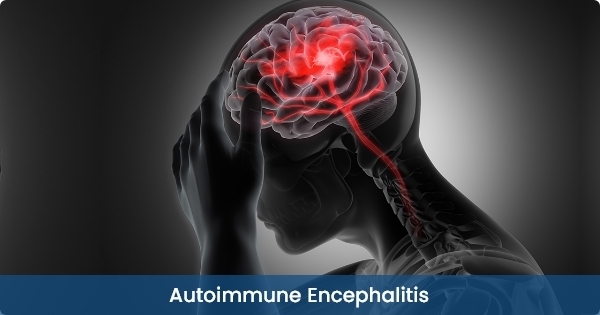Introduction:
- Autoimmune encephalitis is a neurological condition characterized by inflammation of the brain resulting from an autoimmune response.
- Autoimmune diseases occur when the body’s immune system, which is responsible for protecting against harmful substances, mistakenly attacks its own healthy cells and tissues.
- In the case of autoimmune encephalitis, the immune system targets the cells of the brain, leading to inflammation and a range of neurological symptoms.
- Autoimmune encephalitis is a relatively recent discovery in the field of neurology.
- It was only in the past decade that researchers and clinicians began to recognize and understand this condition.
- Prior to that, many cases of encephalitis were believed to be caused by infectious agents such as viruses or bacteria.
- However, advancements in diagnostic techniques and the identification of specific antibodies associated with autoimmune encephalitis have led to improved recognition and diagnosis of this condition.
Stages of autoimmune encephalitis
- Prodromal Stage: This is the initial stage, which may last for weeks or even months. During this stage, individuals may experience nonspecific symptoms such as fatigue, headache, fever, malaise, and mood changes. These symptoms are often mistaken for other common illnesses.
- Neurological Stage: In this stage, neurological symptoms become more prominent. The type and severity of symptoms can vary depending on the specific subtype of autoimmune encephalitis. Some common symptoms include:
- Cognitive changes: Memory problems, confusion, difficulties with attention and concentration.
- Psychiatric symptoms: Anxiety, depression, psychosis, personality changes, hallucinations, delusions.
- Seizures: Epileptic seizures may occur in some cases.
- Movement disorders: Involuntary movements, muscle rigidity, tremors, ataxia (problems with coordination and balance).
- Speech and language difficulties: Aphasia (impairment in language function) or other speech-related problems.
- Crisis Stage: This stage is characterized by a rapid deterioration of neurological and psychiatric symptoms. The person may become acutely confused, agitated, or even comatose. Seizures and other neurological symptoms may worsen. This stage often requires hospitalization and intensive medical care.
- Recovery Stage: With appropriate treatment, many individuals experience a gradual improvement in symptoms during this stage. The length and extent of recovery can vary widely among individuals. Some people may make a full recovery, while others may have residual neurological or psychiatric deficits.
Main cause of autoimmune encephalitis:
- Autoimmune encephalitis is a condition characterized by inflammation of the brain due to an autoimmune response, where the body’s immune system mistakenly attacks healthy brain cells. While the exact cause of autoimmune encephalitis is not fully understood, there are several factors that can contribute to its development. Here are some of the main factors believed to be associated with autoimmune encephalitis:
- Autoimmune response: Autoimmune encephalitis occurs when the immune system mistakenly targets proteins in the brain, leading to inflammation. The exact trigger for this autoimmune response is often unknown, but it can be triggered by various factors such as infections, tumors, or exposure to certain medications.
- Infections: Certain infections, particularly viral and bacterial infections, have been linked to the development of autoimmune encephalitis. Examples include herpes simplex virus (HSV), Epstein-Barr virus (EBV), varicella-zoster virus (VZV), mycoplasma pneumoniae, and streptococcus bacteria.
- Tumors: In some cases, the presence of tumors, especially ovarian teratomas or small-cell lung cancer, can trigger an autoimmune response leading to encephalitis. These tumors may produce proteins or antigens that resemble those found in the brain, causing the immune system to attack both the tumor and the brain cells.
- Paraneoplastic syndrome: Autoimmune encephalitis can be associated with paraneoplastic syndrome, which occurs when the immune system reacts to cancer cells elsewhere in the body and mistakenly attacks the brain. Paraneoplastic syndromes are most associated with lung cancer, ovarian cancer, and breast cancer.
- Genetic predisposition: Certain genetic factors may contribute to an increased susceptibility to autoimmune diseases, including autoimmune encephalitis. However, the precise genetic markers and their role in the development of this condition are still being studied.
Types of autoimmune encephalitis.
- There are several types of autoimmune encephalitis, each characterized by different autoantibodies and clinical features. The classification of autoimmune encephalitis is primarily based on the specific autoantibodies involved. Here are some of the well-known types of autoimmune encephalitis:
- Anti-NMDA receptor encephalitis: This is the most common and widely recognized form of autoimmune encephalitis. It is characterized by the presence of antibodies that target the NMDA receptors in the brain. Anti-NMDA receptor encephalitis primarily affects young individuals and often presents with psychiatric symptoms, memory deficits, seizures, movement abnormalities, and autonomic dysfunction.
- Anti-LGI1 encephalitis: This type of autoimmune encephalitis is characterized by the presence of antibodies against the leucine-rich glioma-inactivated 1 (LGI1) protein. It typically manifests with seizures, cognitive impairment, psychiatric symptoms (such as hallucinations or paranoia), and faciobrachial dystonic seizures (brief, repetitive, involuntary movements of the face and arm on one side).
- Anti-GABAB receptor encephalitis: In this type of autoimmune encephalitis, the immune system produces antibodies that target the gamma-aminobutyric acid B (GABAB) receptors in the brain. Patients with anti-GABAB receptor encephalitis often experience seizures, cognitive impairment, memory problems, and psychiatric symptoms.
- Anti-AMPAR encephalitis: Antibodies against the α-amino-3-hydroxy-5-methyl-4-isoxazolepropionic acid receptors (AMPAR) are associated with this type of autoimmune encephalitis. It can lead to a variety of symptoms, including seizures, memory loss, behavioral changes, and movement abnormalities.
- Anti-CASPR2 encephalitis: Autoantibodies targeting the contact in-associated protein-like 2 (CASPR2) are associated with this form of autoimmune encephalitis. It typically presents with a combination of symptoms, including limbic encephalitis (affecting the brain’s limbic system), peripheral nerve hyperexcitability (such as muscle twitching or stiffness), and neuropsychiatric features.
- Anti-Ma2 encephalitis: This type of autoimmune encephalitis is often associated with tumors, particularly testicular germ cell tumors. It is characterized by the presence of antibodies against the Ma2 protein. Patients may experience symptoms such as limbic encephalitis, brainstem involvement, and endocrine abnormalities.
Life after autoimmune encephalitis
Life after autoimmune encephalitis can vary greatly depending on the severity of the condition, the specific areas of the brain affected, and the effectiveness of treatment. Autoimmune encephalitis is a condition in which the immune system mistakenly attacks the brain, leading to inflammation and a range of neurological symptoms.
Recovery from autoimmune encephalitis can be a gradual process, and the extent of recovery varies from person to person. Some individuals may experience a full recovery and return to their previous level of functioning, while others may have long-term neurological deficits or ongoing symptoms.
Here are some aspects to consider regarding life after autoimmune encephalitis:
Medical management: Treatment for autoimmune encephalitis typically involves immunosuppressive therapies, such as corticosteroids, intravenous immunoglobulin (IVIG), or plasma exchange. After the initial acute phase, ongoing medical management may be necessary to prevent relapses and manage symptoms. Regular follow-up visits with neurologists or other specialists will be important.
Rehabilitation and therapy: Depending on the impact of the condition, rehabilitation therapies such as physical therapy, occupational therapy, speech therapy, or cognitive rehabilitation may be recommended to help regain lost abilities or learn compensatory strategies. These therapies can assist in improving mobility, coordination, speech, memory, and other cognitive functions.
Emotional and psychological support: Autoimmune encephalitis can have significant psychological and emotional effects. Dealing with the challenges of the condition, as well as potential changes in cognitive abilities or personality, can be distressing. It is essential to seek support from mental health professionals, such as therapists or counselors, who can help manage the emotional impact of the condition.
Lifestyle adjustments: Depending on residual symptoms or limitations, individuals may need to adjust their daily routines, work, or social activities. Fatigue, cognitive difficulties, or physical impairments may require pacing oneself, taking breaks, or modifying tasks. Supportive environments, understanding from family and friends, and assistive devices, if needed, can make a significant difference in adapting to these changes.
Education and advocacy: Learning about autoimmune encephalitis and connecting with support groups or organizations can be empowering. It allows individuals to gain knowledge about their condition, share experiences with others who have gone through similar challenges, and advocate for their needs within the healthcare system or wider community.
Monitoring and follow-up care: Regular monitoring of symptoms, routine check-ups, and follow-up with healthcare professionals will be important to manage the condition effectively. Keeping a symptom diary and tracking any changes or concerns can help guide discussions with healthcare providers.
Recovery rate for autoimmune encephalitis
The recovery rate for autoimmune encephalitis can vary widely depending on several factors, including the specific subtype of autoimmune encephalitis, the severity of the initial symptoms, the promptness and effectiveness of treatment, and individual variations in the course of the disease. While some individuals may experience a full recovery, others may have persistent neurological deficits or ongoing symptoms.
Prompt diagnosis and early initiation of appropriate treatment tend to improve the chances of recovery. Immunosuppressive therapies, such as corticosteroids, intravenous immunoglobulin (IVIG), or plasma exchange, are commonly used to control the immune response and reduce inflammation in the brain. In some cases, additional treatments, such as rituximab or other immunosuppressive medications, may be necessary.
Recovery from autoimmune encephalitis can occur in different phases:
Acute phase: During this phase, individuals often experience severe neurological symptoms, such as seizures, altered mental status, cognitive impairments, movement disorders, or psychiatric symptoms. Prompt medical intervention and intensive care may be required. The response to treatment during this phase can be crucial in determining the overall recovery outcome.
Subacute phase: As the acute symptoms subside, individuals may begin to show signs of improvement. However, some residual symptoms or deficits may persist. Rehabilitation therapies, such as physical therapy, occupational therapy, speech therapy, or cognitive rehabilitation, may be recommended during this phase to aid in functional recovery.
Long-term phase: This phase encompasses the period after the acute and subacute phases. Recovery and improvement can continue over an extended period, with the rate and extent varying between individuals. Some individuals may achieve a complete recovery, while others may experience ongoing neurological symptoms, cognitive impairments, or behavioral changes.
Autoimmune encephalitis is a complex condition, and recovery outcomes can be unpredictable. Some individuals may experience relapses or require ongoing medical management to prevent future episodes. Long-term follow-up care and monitoring are generally recommended to address any new symptoms or changes in the condition.
What is the first-line treatment for autoimmune encephalitis?
First-line treatments include intravenous steroids, plasma exchange, and intravenous immunoglobulins, which can be combined in most severe cases. Rituximab and cyclophosphamide are administered as second-line agents in unresponsive cases.
Can MRI detect autoimmune disease?
Autoimmune demyelinating disorders such as ADEM and NMO may be particularly challenging to distinguish from MS, hampering a prompt and accurate diagnosis [10]. MRI is currently the most valuable tool in the diagnosis and differential diagnosis of ADD.
Autoimmune encephalitis symptoms:
Cognitive and Behavioral Symptoms:
- Memory problems
- Confusion
- Difficulty concentrating
- Behavioral changes
- Personality changes
- Psychiatric symptoms (e.g., hallucinations, delusions, paranoia)
- Neurological Symptoms:
- Seizures (may be focal or generalized)
- Movement disorders (e.g., tremors, chorea, dystonia)
- Abnormal movements or postures
- Muscle weakness or paralysis
- Coordination problems
- Balance and gait disturbances
- Sleep Disturbances:
- Insomnia
- Excessive sleepiness
- Changes in sleep patterns
- Sleep-related behaviors (e.g., sleepwalking, night terrors)
- Autonomic Dysfunction:
- Changes in blood pressure, heart rate, or body temperature regulation
- Sweating abnormalities
- Gastrointestinal symptoms (e.g., nausea, vomiting)
- Bladder and bowel dysfunction
- Speech and Language Problems:
- Speech difficulties (e.g., slurred speech, dysarthria)
- Language impairments (e.g., difficulty finding words, comprehension difficulties)
Early recognition and treatment of autoimmune encephalitis are crucial for better outcomes. A neurologist or other healthcare professional with expertise in autoimmune encephalitis should be consulted for a comprehensive evaluation and appropriate management.
Autoimmune encephalitis diagnostic
The diagnosis of autoimmune encephalitis typically involves a combination of clinical assessment, laboratory tests, imaging studies, and sometimes, a cerebrospinal fluid (CSF) analysis. Here are the general steps involved in diagnosing autoimmune encephalitis:
Clinical Assessment: A thorough evaluation of the patient’s medical history, symptoms, and neurological examination is conducted. The symptoms of autoimmune encephalitis can vary but often include cognitive and behavioral changes, seizures, movement disorders, and psychiatric symptoms.
Blood Tests: Blood tests are performed to assess for specific antibodies associated with autoimmune encephalitis. These antibodies can target various proteins in the brain, such as NMDA receptors, AMPA receptors, GABA receptors, and others. Testing for these antibodies can help confirm the diagnosis.
Imaging Studies: Magnetic resonance imaging (MRI) of the brain is usually performed to identify any structural abnormalities or inflammation that may be present. Certain patterns of inflammation seen on the MRI may support the diagnosis of autoimmune encephalitis.
Electroencephalogram (EEG): An EEG is often done to evaluate the electrical activity of the brain. It can help identify abnormal patterns or epileptic activity that may suggest autoimmune encephalitis.
Cerebrospinal Fluid (CSF) Analysis: In some cases, a lumbar puncture (spinal tap) is performed to obtain a sample of CSF, which surrounds the brain and spinal cord. CSF analysis can help detect any abnormalities, such as increased white blood cell count or the presence of specific antibodies.
Evaluation for Underlying Tumors: In some cases of autoimmune encephalitis, the condition may be associated with an underlying tumor, typically a teratoma or small-cell lung cancer. Therefore, additional tests, such as abdominal or thoracic imaging, may be performed to check for the presence of these tumors.
The diagnostic process may vary depending on the suspected type of autoimmune encephalitis and the individual patient’s presentation. Consulting with a neurologist or an autoimmune encephalitis specialist is crucial for an accurate diagnosis and appropriate management.
Autoimmune encephalitis treatment
The treatment of autoimmune encephalitis involves a combination of immunotherapy, supportive care, and management of any underlying causes or complications. The specific treatment approach may vary depending on the type of autoimmune encephalitis and the individual patient’s condition. Here are some common components of treatment:
Immunotherapy: Immunotherapy is the mainstay of treatment for autoimmune encephalitis. It aims to suppress the immune system and reduce the autoimmune response to the brain. The following immunotherapy options may be used:
Corticosteroids: High-dose intravenous corticosteroids, such as methylprednisolone, are often administered initially to reduce inflammation and immune activity.
Intravenous Immunoglobulin (IVIG): IVIG is a treatment that involves infusing a concentrated solution of antibodies obtained from healthy donors. It can help modulate the immune response and reduce autoantibody levels.
Plasma Exchange (Plasmapheresis): Plasma exchange involves removing the patient’s blood plasma, which contains autoantibodies, and replacing it with donor plasma or a plasma substitute. This procedure helps remove the autoantibodies from the circulation.
Rituximab: Rituximab is a monoclonal antibody that targets specific immune cells called B cells. It is used to suppress the production of autoantibodies.
Other immunosuppressive medications: In cases where initial treatments are ineffective, or the disease is severe, other immunosuppressive drugs like cyclophosphamide, azathioprine, or mycophenolate mofetil may be considered.
Supportive Care: Supportive care is essential to manage the symptoms and complications associated with autoimmune encephalitis. It may include:
Seizure management: Antiseizure medications are prescribed to control seizures. The choice of medication depends on the type of seizures and individual patient factors.
Psychiatric support: Many individuals with autoimmune encephalitis experience psychiatric symptoms. Psychiatric medications, psychotherapy, and behavioral interventions can help manage these symptoms.
Symptomatic treatment: Medications may be prescribed to alleviate specific symptoms such as movement disorders, sleep disturbances, or pain.
Management of Underlying Causes: If autoimmune encephalitis is associated with an underlying tumor, such as a teratoma or small-cell lung cancer, appropriate treatment of the tumor, such as surgery or chemotherapy, may be necessary.
References:
https://www.ncbi.nlm.nih.gov/pmc/articles/PMC4712273
https://www.ohsu.edu/brain-institute/autoimmune-encephalitis .





